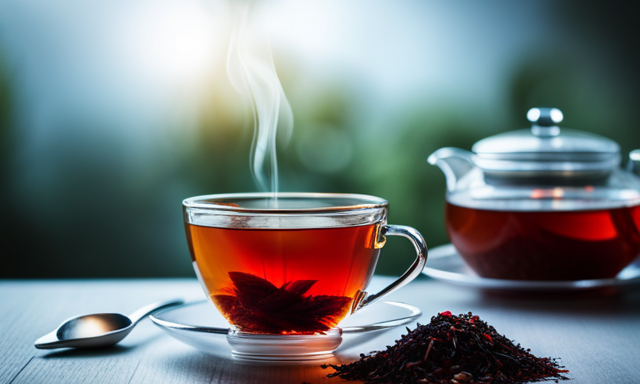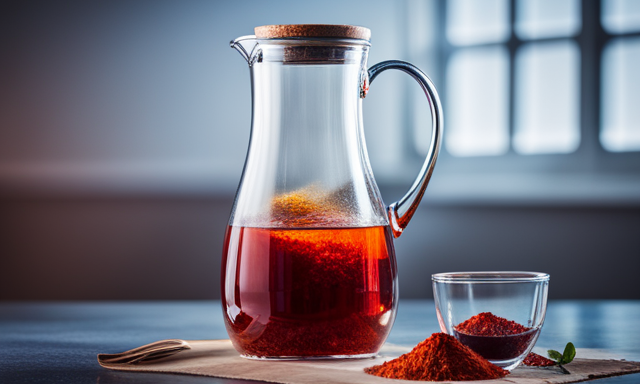As a health enthusiast, I’ve always been intrigued by the impact that certain foods and beverages can have on our hormones. One particular drink that has caught my attention is rooibos tea. With its rich, earthy flavor and numerous health benefits, rooibos tea has gained popularity in recent years. But what exactly does it do to our hormones?
In this article, we’ll delve into the fascinating world of hormones and explore the effects that rooibos tea has on our hormonal balance. Hormones play a crucial role in our overall well-being, regulating everything from our mood to our metabolism. So, it’s no wonder that maintaining a healthy hormonal balance is of utmost importance.
Through extensive research and scientific studies, we’ll examine the nutritional profile of rooibos tea and its potential impact on hormonal health. From menstrual health to thyroid function, we’ll uncover the potential benefits that this herbal tea can offer.
So, grab a cup of rooibos tea and join me on this journey to discover how it can positively affect our hormones for a better, healthier life.
Key Takeaways
- Rooibos tea can reduce cortisol levels and promote relaxation, aiding in managing stress and promoting hormonal balance.
- Rooibos tea has the potential to modulate thyroid hormone production and activity, supporting healthy hormone production and balance.
- Hormonal balance is essential for overall well-being and vitality, impacting energy levels, mood regulation, and immune system function.
- Diet and lifestyle choices, exposure to environmental toxins and hormone disruptors, and regular exercise and stress management play a crucial role in maintaining hormonal health.
Understanding Hormones and Their Importance in the Body
Understanding the intricate role that hormones play in our bodies is essential for grasping the potential impact that rooibos tea may have on our hormonal balance.
Hormones are chemical messengers that regulate various bodily functions, from metabolism to reproduction.
When hormonal imbalances occur, it can lead to a range of health issues, known as hormonal disorders. These can manifest as irregular menstrual cycles, mood swings, weight gain, and even infertility.
Research suggests that certain compounds found in rooibos tea, such as antioxidants and polyphenols, may have a positive effect on hormone levels and help restore balance.
By incorporating rooibos tea into our daily routine, we may potentially alleviate the symptoms associated with hormonal imbalances.
Now, let’s delve into the nutritional profile of rooibos tea to further understand its potential benefits.
The Nutritional Profile of Rooibos Tea
The nutritional profile of Rooibos tea is characterized by its abundance of vitamins and minerals. One key aspect is its high content of vitamin C, which supports the immune system and promotes collagen production.
Rooibos tea also contains important minerals like calcium, magnesium, and potassium. These minerals are essential for maintaining healthy bones, muscles, and nerve function.
Another notable component of Rooibos tea is its high antioxidant content. Antioxidants have been shown to have positive effects on hormones by neutralizing free radicals in the body. This helps to reduce oxidative stress and potentially improve hormonal balance.
Vitamins and Minerals in Rooibos Tea
Imagine how amazed you’ll be when you discover just how many essential vitamins and minerals are packed into a single cup of rooibos tea! This delightful beverage is a rich source of vitamins and minerals that can have numerous benefits for skin health. Take a look at the table below to see some of the key vitamins and minerals found in rooibos tea:
| Vitamins | Minerals |
|---|---|
| Vitamin C | Calcium |
| Vitamin E | Magnesium |
| Vitamin D | Potassium |
Vitamin C, known for its antioxidant properties, helps in collagen production, promoting healthy and youthful skin. Vitamin E protects the skin from damage caused by free radicals, while vitamin D supports skin cell growth and repair. Calcium, magnesium, and potassium are essential minerals that contribute to skin health by maintaining proper hydration and promoting a clear complexion.
Now, let’s delve into the fascinating world of antioxidants and their hormonal effects.
Antioxidants and Their Hormonal Effects
Get ready to be amazed by the incredible impact antioxidants can have on your hormones and overall well-being! Rooibos tea is packed with antioxidants that can positively affect hormonal balance. Here are three ways antioxidants in rooibos tea can benefit your hormones:
-
Antioxidants and fertility: Studies have shown that antioxidants can improve fertility by reducing oxidative stress and inflammation in the reproductive system. Rooibos tea, with its high antioxidant content, may support reproductive health and increase the chances of conception.
-
Rooibos tea and hormonal acne: Hormonal acne is often caused by imbalances in hormone levels. Antioxidants in rooibos tea can help reduce inflammation and regulate hormone production, potentially improving the appearance of hormonal acne.
-
Research on rooibos tea and hormonal balance: Ongoing research is exploring the relationship between rooibos tea and hormonal balance. Studies suggest that the antioxidants in rooibos tea may play a role in regulating hormone levels, but more research is needed to fully understand the extent of this effect.
Now, let’s delve into the research on rooibos tea and hormonal balance.
Research on Rooibos Tea and Hormonal Balance
Discover the amazing benefits of rooibos tea and how it can help you maintain hormonal balance.
Research findings suggest that rooibos tea may play a role in hormonal regulation. A study conducted on animals demonstrated that rooibos tea extract had a positive effect on estrogen and progesterone levels, leading to improved hormonal balance.
Another study on postmenopausal women reported that rooibos tea consumption resulted in reduced levels of luteinizing hormone, which is involved in the regulation of the menstrual cycle.
These findings highlight the potential of rooibos tea in promoting hormonal equilibrium.
Moving forward, it is important to explore the specific mechanisms by which rooibos tea affects hormone levels and to conduct further research to validate these findings.
Transitioning into the subsequent section on the role of rooibos tea in menstrual health, it is essential to understand the wider implications of hormonal balance in women’s reproductive health.
The Role of Rooibos Tea in Menstrual Health
Transitioning into a realm of vibrant well-being, the delicate dance of the menstrual cycle is intricately intertwined with the potential benefits of indulging in the crimson-hued elixir known as rooibos tea. Research suggests that rooibos tea may play a role in supporting menstrual health and hormonal regulation. Here are five ways rooibos tea can positively impact the menstrual cycle:
- Regulates hormone levels: Rooibos tea contains antioxidants that may help balance hormone levels, promoting a regular menstrual cycle.
- Reduces menstrual pain: The anti-inflammatory properties of rooibos tea may alleviate cramps and discomfort during menstruation.
- Relieves PMS symptoms: Rooibos tea’s calming effects can help reduce mood swings, bloating, and irritability associated with premenstrual syndrome.
- Supports iron levels: Rooibos tea is iron-rich, which can help prevent iron deficiency anemia, a common issue during menstruation.
- Promotes relaxation: Sipping on a warm cup of rooibos tea can provide a soothing effect, reducing stress and promoting overall well-being during the menstrual cycle.
As we explore the potential benefits for men’s hormonal health, let’s delve into the next section.
Potential Benefits for Men’s Hormonal Health
Let’s explore the potential ways rooibos tea can support men’s hormonal health.
While rooibos tea is often associated with women’s health, it can also have beneficial effects on men’s hormonal balance. One key aspect is its potential to support menopause. Rooibos tea contains antioxidants that may help alleviate symptoms such as hot flashes and mood swings.
Preliminary studies suggest that rooibos tea may have a positive impact on testosterone levels in men. This potential enhancement of libido and overall vitality is promising. However, more research is needed to fully understand the mechanisms behind these effects.
In the next section, we will delve into the impact of rooibos tea on stress hormones, which play a crucial role in overall hormonal health.
Impact of Rooibos Tea on Stress Hormones
One of the key stress hormones in our body is cortisol, which is produced by the adrenal glands. Research suggests that Rooibos tea may have a positive impact on cortisol levels, helping to regulate the body’s stress response.
Studies have shown that Rooibos tea can reduce cortisol levels, thereby promoting relaxation and reducing anxiety. This is attributed to the presence of antioxidants and other bioactive compounds in Rooibos tea that have a calming effect on the adrenal glands.
By modulating cortisol levels, Rooibos tea may aid in managing stress and promoting overall hormonal balance.
Potential Effects on Thyroid Hormones
Research has shown that Rooibos tea may have a profound impact on the delicate balance of thyroid hormones, potentially leading to improved overall well-being. Thyroid function plays a crucial role in regulating metabolism, growth, and development.
The active compounds found in Rooibos tea have been found to modulate thyroid hormone production and activity. Specifically, studies have indicated that Rooibos tea can help to regulate the levels of thyroid-stimulating hormone (TSH) and thyroxine (T4), which are key hormones involved in the regulation of the thyroid gland.
By supporting optimal thyroid function, Rooibos tea may help to promote healthy hormone production and balance. This can have significant implications for overall health, as hormonal balance is essential for various bodily functions, including energy levels, mood regulation, and immune system function.
Achieving and maintaining a healthy hormonal balance is crucial for overall well-being and vitality.
The Importance of Hormonal Balance for Overall Health
Maintaining a healthy balance of hormones is crucial for overall well-being and vitality. It impacts energy levels, mood regulation, and immune system function. Hormonal imbalance can lead to a variety of negative effects. These include fatigue, mood swings, weight gain, and even fertility issues.
Addressing hormonal imbalance is essential for optimal health. Fortunately, there are natural remedies available to help restore balance. One such remedy is rooibos tea. It has been found to have potential effects on hormones. For example, it can regulate cortisol levels and reduce stress. Additionally, the antioxidants in rooibos tea may help protect against oxidative stress, which can disrupt hormonal balance.
Exploring natural remedies like rooibos tea can be a beneficial step towards achieving hormonal balance. However, it’s important to consider other factors that can influence hormonal health.
Other Factors Influencing Hormonal Health
When it comes to hormonal health, there are several factors that can influence it. Two important ones are diet and lifestyle choices, as well as exposure to environmental toxins and hormone disruptors.
Research has shown that a balanced diet with adequate nutrients can support hormonal balance, while certain lifestyle choices like regular exercise and stress management can also play a role.
Additionally, exposure to environmental toxins and hormone disruptors, such as certain chemicals found in household products and pesticides, can negatively impact hormonal health.
Therefore, it is crucial to consider these factors and make informed choices to maintain optimal hormonal balance.
Diet and Lifestyle Choices
Making healthy diet and lifestyle choices, such as incorporating rooibos tea into your daily routine, can have a positive impact on hormonal balance. ‘You are what you eat’ rings true when it comes to maintaining hormone health. Here are four ways in which diet and lifestyle choices can influence hormonal regulation:
-
Balanced Macronutrients: Consuming a diet rich in lean proteins, healthy fats, and complex carbohydrates provides the necessary building blocks for hormone production and regulation.
-
Phytoestrogens: Certain plant compounds found in foods like soy, flaxseeds, and rooibos tea can mimic estrogen in the body, helping to balance hormone levels.
-
Blood Sugar Control: Maintaining stable blood sugar levels through a balanced diet and regular exercise can prevent insulin resistance, which is often associated with hormonal imbalances.
-
Gut Health: A healthy gut microbiome plays a crucial role in hormone metabolism and regulation. Consuming a diet high in fiber, probiotics, and fermented foods supports a healthy gut.
By making these choices, we can support hormonal balance and overall well-being.
Transitioning into the next section, it is also important to consider the impact of environmental toxins and hormone disruptors on our hormonal health.
Environmental Toxins and Hormone Disruptors
To optimize your hormonal health, it is crucial to be mindful of the potential impact of environmental toxins and hormone disruptors.
Environmental toxins can include chemicals found in everyday products such as plastics, pesticides, and cleaning agents. These toxins have the ability to interfere with the endocrine system, which regulates our hormones. They are known as endocrine disruptors and can mimic or block the effects of natural hormones in the body.
Research has shown that exposure to these disruptors can lead to a range of hormonal imbalances, including disruptions in estrogen, testosterone, and thyroid hormones. Therefore, it is important to minimize exposure to environmental toxins by choosing natural and organic products, avoiding plastics, and using non-toxic cleaning agents.
By doing so, you can support your hormonal health and reduce the risk of hormone-related health issues.
Conclusion and Recommendations for Incorporating Rooibos Tea
For a cozy and hormone-balancing addition to your daily routine, consider incorporating rooibos tea into your diet. After reviewing the research on rooibos tea and its effects on hormones, it can be concluded that this herbal tea has the potential to positively impact hormone balance. Rooibos tea contains antioxidants and phytoestrogens, which can help regulate hormone levels and reduce the risk of hormone-related disorders. Additionally, the absence of caffeine in rooibos tea makes it a great alternative to traditional caffeinated beverages that can disrupt hormone balance.
To summarize, incorporating rooibos tea into your daily routine can be a natural and enjoyable way to support hormone balance. However, it is important to note that individual responses may vary, and it is always recommended to consult with a healthcare professional before making any significant changes to your diet or lifestyle. So, why not cozy up with a cup of rooibos tea and give your hormones a little extra love?
| Benefits of Rooibos Tea | Effects on Hormones | Recommendations |
|---|---|---|
| Rich in antioxidants | Helps regulate hormone levels | Incorporate into daily routine |
| Contains phytoestrogens | Reduces risk of hormone-related disorders | Consult with healthcare professional |
| Caffeine-free | Alternative to disrupt hormone balance | Enjoy as a cozy and comforting beverage |
Frequently Asked Questions
Can rooibos tea be used as a natural remedy for hormonal imbalances?
Rooibos tea has been studied for its potential to help maintain hormonal balance. While more research is needed, it is considered a natural remedy that may assist in managing hormonal imbalances.
Are there any potential side effects or risks associated with consuming rooibos tea for hormonal health?
Potential risks and precautions should be considered when consuming rooibos tea for hormonal health. One interesting statistic is that excessive intake of rooibos tea may lead to liver damage, emphasizing the importance of moderation.
How long does it take for rooibos tea to have an effect on hormone levels?
The effectiveness and duration of rooibos tea on hormone levels can vary. Studies suggest that it may take several weeks of regular consumption to notice any significant effects on hormone balance.
Can rooibos tea help with symptoms of menopause, such as hot flashes and mood swings?
Rooibos tea may help alleviate symptoms of menopause, such as hot flashes and mood swings. Its benefits lie in its potential to regulate hormones, making it a natural and research-based option for menopausal relief.
Are there any specific guidelines or recommendations for incorporating rooibos tea into a hormonal health regimen?
When it comes to incorporating rooibos tea into a hormonal health regimen, it’s important to follow guidelines. Rooibos tea is known for its benefits in hormone balance, making it a valuable addition to any hormonal health routine.
Conclusion
In conclusion, incorporating Rooibos tea into your daily routine can have a positive impact on hormonal balance. Research suggests that the antioxidants and phytochemicals present in Rooibos tea may help regulate hormonal levels, particularly in women during their menstrual cycle.
One study found that women who consumed Rooibos tea experienced a decrease in menstrual pain and improved mood. This can be compared to a gentle breeze that soothes the raging storm within, providing relief and harmony to the intricate dance of hormones in our bodies.
So, sip on a cup of Rooibos tea and let its subtle power restore balance to your hormonal health.










